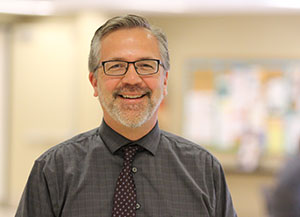 Winona Daily News Guest Column: I choose to identify
Winona Daily News Guest Column: I choose to identify
By Chad Dull, Vice President of Academic Affairs, Minnesota State College Southeast
October 25, 2021
Twenty years ago, I was teaching a remedial English course for students who had not passed English in high school. The class met on Monday and Tuesday nights for a three hour block. Like most teachers, I remember all of the students from those classes, but some more than most. In that first semester, I have a keen memory of a particular student -- let's call her Sheila.
I didn't notice Sheila much the first night, but I did the second night when she came to class with her very young baby. She told me her planned child care had fallen through, and this six week old baby would need to come to class with her the rest of the semester. I responded I wasn't sure if children were allowed in class, and suggested maybe she drop the course. What she said next changed my professional life.
"Chad, if I drop this class, I am afraid I'll become a statistic, another teen mom who didn't finish school." Sheila didn't know it, but I was the son of a teen mother, and her point landed home with force.
In the meantime, I had checked, and the college I was working at did not allow children in class. However, I chose to ignore that policy, and Sheila brought her daughter with her to class and assured me the baby would mostly sleep. I was the parent of a one-year-old at the time, and I suspected she was wrong... correctly as it turned out.
It was a challenging semester. I held the baby on more than one occasion, as did other students in the class. There were nights Sheila fell asleep during working time, and we would monitor her daughter so she could get some much needed rest. But at the end of the term, Sheila was a not a statistic. She passed the class, and was able to move on to what she wanted to pursue next. I haven't seen her in twenty years, but she reminded me what the world looked like through her eyes, and changed my approach to education forever.
Like many others, I am an admirer of the late Dr. Martin Luther King, Jr. When my children were young, I accompanied each of them on safety patrol trips to Washington, DC. Among the many moving and powerful sites we visited was the memorial to Dr. King. It is a remarkable place and contains many statements and quotations that have stuck with me. Dr. King was a powerful speaker, and many people refer to his writing and speaking for inspiration.
For me personally, something he said to his congregation in 1966 changed my life: "I choose to identify with the underprivileged, I choose to identify with the poor..." In the last two years of his life, Dr. King was focused on the elimination of poverty, an issue that resonates deeply with me.
At Minnesota State College Southeast, our most recent strategic plan referred to having a "poverty-informed infrastructure." What does that mean in practice? It means we choose to identify with our students facing the crisis of poverty, and work toward making college possible for them. An open access college is exactly the place people who are struggling economically should be able to come and work to improve their circumstances. That is what we strive to do.
It might be partnering for free transportation, building robust food pantries, or creating emergency funds for unexpected expenses, but it all begins with the choice to identify with our students and see our success as linked to one another. It means understanding that poverty is a context and a situation, not a character flaw. Our poverty-informed college respects the courage it takes to come to college when your life is tenuous, and we work hard to honor students' courage with our culture of caring.
The quote I mentioned earlier goes on and ends with these powerful words, "...I heard a voice saying, 'do something for others.'" My student Sheila was a voice I heard, and I am proud our college chooses to hear the voices of our students and do everything we can for them. Creating a place informed by poverty benefits everyone.